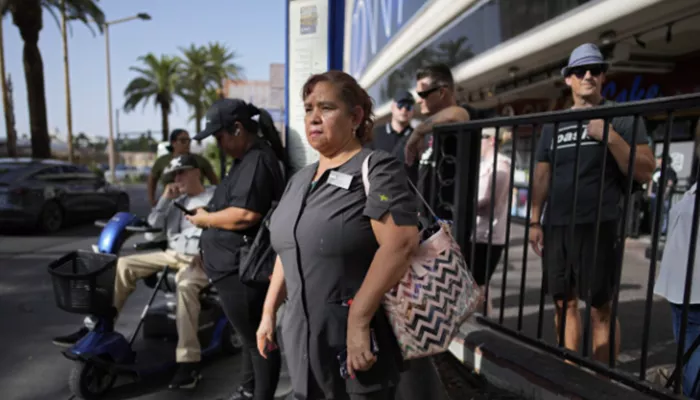Immigration’s Role in Nevada’s Economy and Presidential Race.
LAS VEGAS (AP) — In the remote Nevada desert, the Baker Ranch relies heavily on immigrant guest workers from Mexico each year. About 300 miles south, Las Vegas thrives as a vacation destination for Americans from diverse backgrounds, with immigrants crucial to its 24-hour economy.
As the presidential election heats up, immigration remains a contentious issue, causing fear and frustration among voters. Many immigrants who have lived in the U.S. for years argue that the complexity of the issue is overshadowed by simplistic solutions offered by both parties.
The impact of immigration is particularly evident in Nevada, a key swing state that could influence the election outcome. The state’s immigrant population contributes significantly to the economy, despite increasing concerns about illegal border crossings that strain resources. Encounters with law enforcement have decreased, but immigration continues to drive job growth.
Former President Donald Trump advocates for strict measures, including mass deportations. In contrast, Vice President Kamala Harris proposes pathways to citizenship for many undocumented individuals while also calling for enhanced border security and stricter asylum regulations.
“I think that our focus is completely directed into the border and not toward the people who are already here,” said Erika Marquez, an organizer with Make the Road Nevada.
Bipartisan Support for Guest Worker Programs
Both political parties recognize the importance of guest worker programs in agriculture. During the pandemic, the Trump administration classified guest farmworkers as essential, increasing program participation. However, Trump also proposed a freeze on their salaries and relaxed housing requirements. The Biden administration reversed these rules, leading to a rise in H-2A visa approvals but also introduced new regulations aimed at protecting workers, which have frustrated some employers.
“This is a hot potato, and both sides are to blame,” said Janille Baker, who manages the ranch’s finances. “Fearmongering won’t solve the issue.”
The Economic Impact of Immigrants in Nevada
In Nevada, nearly 19% of residents are foreign-born, and about 9% of the workforce lacks legal status. If all undocumented workers were removed, job losses could rival those seen during the 2008 financial crisis.
Peter Guzman, president of the Latin Chamber of Commerce in Nevada, emphasized that without immigrants, the state’s hotels and casinos could not operate effectively.
Even efforts to round up undocumented workers would not account for those with temporary protected status or authorized guest workers.
Haydee Zetino, a hotel cleaner from El Salvador with temporary protected status, expressed concern over potential policy changes if Trump were to be re-elected. “They believe they can improve the economy without considering those at the bottom,” she said.
Nevada’s Influence on Election Day
The Pew Research Center estimates that 11 million undocumented immigrants reside in the U.S. While larger states like California and Texas have significant populations, Nevada’s status as a swing state makes it a focal point in the upcoming election.
Despite its six electoral votes, Nevada could swing either way. Clark County, which includes Las Vegas, holds 75% of the state’s population and has a strong hospitality worker presence, supported by the Culinary Union’s endorsement of Harris.
However, Trump’s outreach to infrequent voters in 2020 suggests that the election outcome remains uncertain, with voters in rural areas leaning more conservative. Washoe County, home to Reno, also represents a battleground.
The stakes have left many voters apprehensive. “There’s a lot of fear,” said Nancy Valenzuela, a maid at the Strat casino. “People without papers worry they might be thrown out.”
Related topics:
- Portugal Golden Visa Applicants Sue to Accelerate Approval Process
- Russia’s Conflicts: Immigration as a Tactical Tool
- 11 Million Undocumented Immigrants Could Have Gained Citizenship Under Kamala Harris’s Proposed Bill


